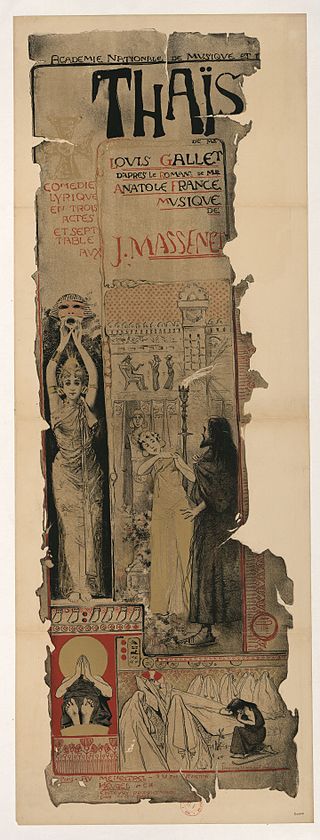
Word of the Day: Cajole
Paul Schleifer
According to the OED, to cajole someone is to “get one’s way with [that someone] by delusive flattery, specious promises, or any false means of persuasion.” Synonyms include coax, persuade, entice, but I am not sure that the synonyms get the idea of “specious promises” or “false flattery.”
The word comes into English, according to www.etymonline.com, in the “1640s, from French cajoler “to cajole, wheedle, coax,” a word of uncertain origin; perhaps a blend of Middle French cageoler “to chatter like a jay” … and Old French gaioler “to cage, entice into a cage.” So the sense is that one chatters like a bird, saying anything that pleases one’s victim, until that victim is persuaded to do something not in the victim’s self-interest.
On this date in 1894, the opera Thaïs, by Jules Massenet and with a libretto by Louis Gallet, premiered at the Opéra Garnier in Paris. It was based upon a novel of the same name by Anatole France. Massenet wrote the opera, and in particular the title role, for the American soprano Sibyl Sanderson, for whom he also wrote the title role of Esclarmonde.
The title role of Thaïs is, apparently, a very difficult role for a singer, so the opera has been produced relatively infrequently in its 124-year existence. Modern performers have included Leontyne Price and Beverly Sills. I was fortunate enough to see Beverly Sills perform the role at the Metropolitan Opera back in 1977 (I think). It was my first opera, and it was a real eye opener.
I took a class back in college that looked at a variety of the performing arts, including opera. Dr. Rupert Barber worked hard to convince us that opera is the pinnacle of the performing arts because it contains music, singing, acting, and dance. Of course, one can recognize that an art form or a particular work of art is superior without enjoying it as much as something else. I have seen operas since and really enjoyed them, but it is a bit harder to get to the opera here in Central, SC. But La bohème by Giacoma Puccini has been to the Brooks Center for the Performing Arts at Clemson University, and my dear friend Ellen Schlaefer (who was also in that class back at Davidson College) puts on operas at USC in Columbia, though I have not made it to very many of her productions, sadly.
One of the things that made Thaïs a good experience for me was that our class prepared to see it. When we go to the movies, we just go. We don’t think that we need to prepare to see a movie, though there are a lot of movies based on books where reading the book first OUGHT to be required (The Lord of the Rings, The Hunger Games, I, Robot, etc.). We don’t even prepare to go see an O’Neill play. But I think it helps to prepare oneself to go to the opera, especially given that the language is often not English. Thaïs is in French; La bohème is in Italian.
As I recall, I read a translation of the novel by Anatole France and did a report on how Gallet adapted it. We listened to the music before we went. We talked about the plot and the staging. We looked over a translation of the libretto. And then, when we actually saw the opera in New York, we had a really good idea of what was going on. Of course, today many opera venues include a Surtitles (or supertitles), a running translation of the libretto above the stage. While many opera purists dislike Surtitles, I think they’re great.
One of the sad things about opera in the modern period is that it has become almost completely an art for the elites. It wasn’t always that way. There was a time when opera was enjoyed by people from a variety of classes, and more recently than the 19th century. Let me illustrate this with a story from my father.
My paternal grandparents were blue collar folks. My grandmother did go to teachers’ college, but she did not teach very long. My grandfather was a police officer when he met his wife, but she convinced him to leave that job and open a hardware store. As you might imagine, money was tight through the Depression. But love and education were abundant, and my father developed a love for classical music, among other things. So, unable to afford tickets to the Academy of Music, he volunteered as an usher.
Classical music is a sober affair, most of the time (excepting PDQ Bach). But occasionally Italian opera would come to Philadelphia, and on those occasions, the balcony, where my father ushered, became something different. People from South Philly, which then was a largely Italian, working-class area of the city, would get tickets up in the cheap seats. And when the tenor began to sing an aria, those Italian men would stand and sing along. Yes, they would sing along, like teenagers at a rock concert.
If you like music, and if you like drama, you really should give opera a try. You might want to reach out to someone who is familiar with the opera you are planning to attend, or you might want to spend a little time preparing to see the opera.
So, I guess you could say that I’m trying to persuade you to give opera a try. But I’m not cajoling you because the promise of something really neat is true.
And one more quick thing: Thaïs contains a famous Méditation, the entr’acte for violin and orchestra played between the scenes of act 2. It is one of the most beautiful pieces of music ever written.
The image is of an 1895 poster for Jules Massenet’s opera Thaïs.